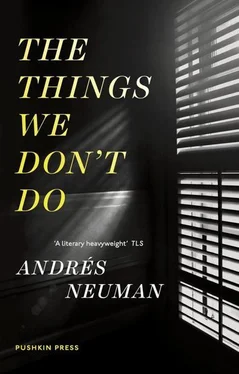Compared to his wife, my great-grandfather Jacobo was a simple soul. It could be said that his true job was that of being a grandfather. His greatest pleasure came from watching his grandchildren eat, from sharing their delight and appetite. Going for a stroll with zeide was like going shopping with a silver-haired child. He would encourage his grandchildren to order giant desserts, and then watch, enthralled, as they devoured them. Such was his enthusiasm that even my father, who had a natural sweet tooth ended up begging his grandfather to rein himself in. Jacobo wanted it all, and wanted to give it all away. Perhaps his motto was that inheritances should be passed on in our lifetime.
On one occasion, my grandfather asked my father to keep an eye on Jacobo. Zeide was ill, and the doctor had forbidden him to smoke more than three cigarettes a day. My father’s job was to ration the packets that he carefully hid and checked every morning. It was only after meals, or in the heat of a discussion that zeide was allowed a cigarette. At these moments, my father would stand up ceremoniously, go in search of the secret hiding-place and return proudly, mission accomplished. It was only several years later that my father learned that Jacobo, in addition to the three cigarettes he took from him with a hangdog expression, would smoke an entire packet whenever he went out for a walk on the pretext of buying his grandson some sweet or other.
Baba Lidia was so thin it seemed like a conviction. However, as time went by, the skin began to hang down flabbily from her arms. Discreet as she was, and despite protesting Tsk! Tsk! my great-grandmother Lidia always seemed to accept my father’s pleas: she rolled up her sleeves so that he could tug on her drooping skin, like a final, refined act of cannibalism. This skin-pulling ceremony went on well past those days. Even after he was a married man, my father continued to beg her to roll her sleeves up, and she continued to resist, knowing full well that sooner or later she would let him pinch her soft flesh. There was only one thing forbidden (apart from refusing a plate of food) in baba Lidia’s house: to say anything against Argentina. Gratitude had turned my Lithuanian great-grandmother into a diehard patriot. If my father ever insinuated that any situation in the country was unacceptable, Lidia frowned, the old emerald flame rekindled behind her glasses, and she retorted: Tsk! Tsk! Hey you, don’t go attacking Argentina, do you hear me? This is a rich, generous country, so be careful eh, don’t go attacking Argentina.
The corporal looked askance at them, slowly puffing out the smoke from his cigarette. He kept his eye on them as if one of them could possibly escape from there, half-naked as they were, sitting, with their feet pressed together, on those uncomfortable wooden benches. The stocky corporal was smoking at his desk, glancing in a bored fashion at the candidates’ passports like someone waiting their turn at a hairdresser’s. He drew the number 1 under the collarbone of those yet to be examined by the barracks’ doctor, and sent them out. Those who had been examined, like my father, were rewarded with a number 2, and kept in the room with him in their vests and underpants. They had been ordered not to get dressed again, in case an examination had to be repeated. This was in 1969, and for the first time in his life my father began to suspect that his clumsy flat feet would not be sufficient to get him out of doing his military service. At least not now, in the midst of a dictatorship, with patriotic fervour maiming all the roads.
Almost all the young men there had heard stories about the humiliations suffered by those who, for whatever reason, were declared unfit for military service. Some were made to wait the whole day sitting, without permission either to get dressed or to have anything to eat. Others, especially the obese or effeminate, were made to see the doctor several times, and were subjected to medical examinations that went far beyond the strictly necessary. Even so, that morning my father had gone to the barracks with the hope that, at least this once, his problem feet would be an advantage. But the cold was growing more intense, the wooden slats were pressing into his legs and buttocks, and my father could see how a lot of his companions came out of the medical room with a terrified grimace on their faces. Every so often, the corporal reluctantly uttered a name, and somebody got up from the bench, walked head down to the counter and received his documents allowing him to go home. Someone asked if they could smoke. The corporal looked up, blew out a mouthful of black smoke and replied, pointing to the wall:
“Obviously not, recruit. Can’t you see the sign? Or can’t you read?”
A couple of hours later, and the future conscripts were feeling the pangs of hunger. Any movement was sporadic, and appeared to depend more on the whim of the doctor or the corporal than on any established order. Almost all the lads who had left had been the ones whose passports had been stamped with the feared slogan: “Fit for Service”. Then all of a sudden, the corporal stared intently at one of the passports. His eyes opened wide and he called out:
“Let’s see! Neuman, Víctor! Stand up and come over here.”
My father obeyed, more in fear than in hope. As he came closer to the desk, the corporal’s gaze seemed to him too intense for it to be good news. In his underpants, skinny, younger than I am now, my father started to tremble. He had no inkling what the corporal was going to ask him:
“You wouldn’t by any chance be related to Monkey Neuman, the midfielder who plays for Chacarita, would you?”
Confused, my father smiled silently trying to win a few seconds to think.
“Are you going to answer or not, dammit? Do you know him at all, Monkey Neuman?”
My father felt an icy Siberian wind run down his back, as if the air was rushing in from the past, and then felt the sudden push of a luminous idea which made the time stranded in that room break free of its moorings and begin to race along. With all the aplomb he could muster, my father said to the corporal:
“Well, as far as knowing him goes, I should think I do know my brother, yes.”
The corporal raised his eyebrows and half-opened his lips in a complicated smile that made the cigarette roll round.
“Come closer, for fuck’s sake, or aren’t you and I going to be able to hold a proper conversation man to man? That’s better. So he’s your brother, you say? Really and truly?”
“Oh, if you only knew, Corporal sir, how often people ask me that very same question!”
“Yes, of course, I can just imagine it. But che , that’s incredible! And do you know how often I’ve been to the ground to see him play? Because you must be a Chacarita fan too, aren’t you?”
“Of course, Corporal sir,” replied my father, who had never in his life been interested in football, and whose father had been a supporter of Racing Club de Avellaneda.
“That’s my boy! What a coincidence! I can’t believe it! Shit, what a goal your brother scored last Sunday, eh? So please let your brother know,” the corporal went on, in a more serious tone of voice, trying to regain his earlier composure, “that here in the barracks we all think highly of him, and consider him to be an example for the youth of Argentina. Be sure you pass on that message, Neuman.”
“You can be certain I will, Corporal sir.”
“As I was saying, here in the barracks three of us are Chacarita fans.”
“Forgive me for correcting you, Corporal sir. But right now, there are exactly four of us.”
Читать дальше












